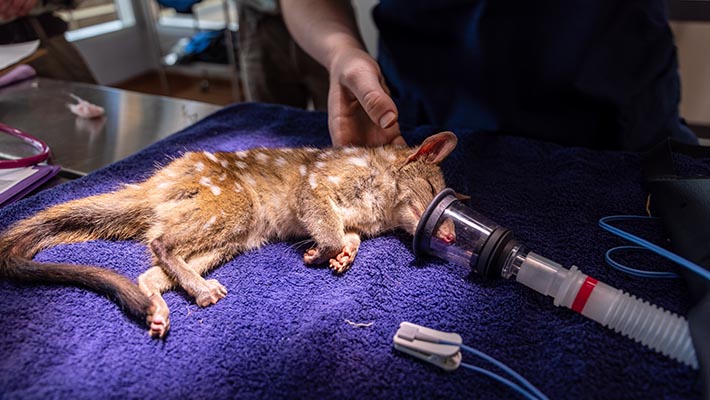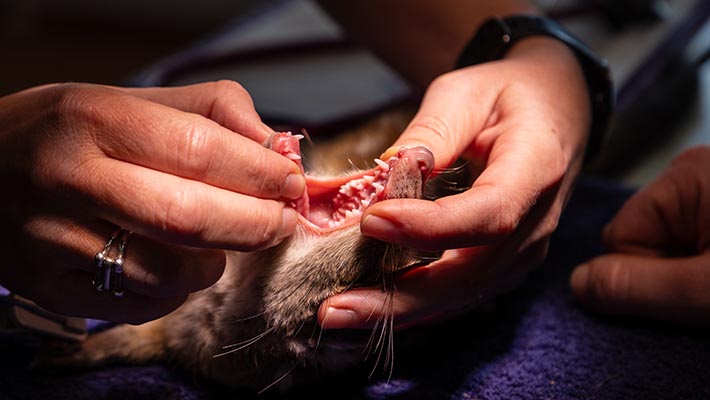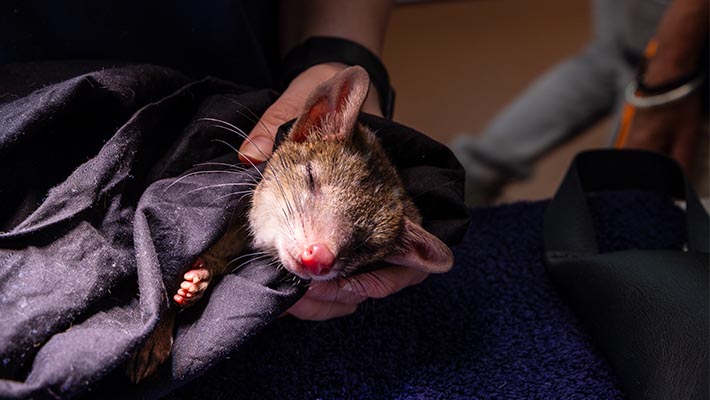Posted on 31st January 2025 by Media Relations
16 Western Quoll returned to the wild
The quest to bring the endangered Chuditch back from extinction in NSW continues in Sturt National Park, with a further 16 individuals bred at Taronga Western Plains Zoo returned to the wild.
Also known as Western Quoll, the Chuditch is one of four species of quoll in Australia and was once found across 70% of mainland Australia, but has been reduced to just 5% of its former range since European settlement.
The species was extinct in NSW until 2024, when 16 Taronga-bred individuals were released into Sturt National Park, marking the species’ return after more than a century. Now their population has been further bolstered with the release of another 16 Chuditch to the 35,000 hectare site.



The project at Sturt National Park is a collaboration between NSW National Parks and Wildlife Service, Taronga Conservation Society Australia and UNSW Sydney’s Centre for Ecosystem Science and Ecological Horizons, operating as Wild Deserts.
“It is important to return Chuditch to this site because as a top-level predator, they play such a key, important role within these ecosystems,” said Taronga Wildlife Conservation Officer Rachael Schildkraut.
“Taronga’s conservation breeding program is a significant program for the recovery of this species. It’s helping to support a number of reintroductions into areas where the species had become locally extinct.
“Taronga’s Chuditch conservation breeding program simply wouldn’t be possible without important partnerships with government agencies such as the NSW Government and Western Australian Department of Biodiversity, Conservation and Attractions (DBCA), other conservation agencies, and of course with the support of generous philanthropic donors.”
NSW Minister for Climate Change, Energy, Environment and Heritage Penny Sharpe MLC said: “The Minns Labor Government is bringing the Western Quoll back from extinction in NSW, as part of our commitment to turning around biodiversity loss and restoring habitats and ecosystems. Our goal is to leave nature better off than we found it.
“Conservation efforts are all about partnerships and this is another great example of what can be achieved when governments and conservation organisations work together.”
Taronga’s Chuditch conservation breeding program was established in 2022, thanks to a generous philanthropic donation from The Kinghorn Foundation.
The program sees wild-caught Chuditch translocated to large, complex breeding habitats within the Taronga Sanctuary, a 110-hectare feral predator proof area behind the scenes of Taronga Western Plains Zoo on Wiradjuri Country near Dubbo.
Here the animals are monitored remotely using camera traps to minimise human interaction and retain as many wild characteristics as possible.
In 2024, Taronga teams achieved their most productive breeding season yet for the endangered marsupial, with a record 35 joeys born to seven breeding pairs.
The Chuditch underwent thorough health checks at the Taronga Wildlife Hospital, Dubbo, receiving the vets’ tick of approval to embark on their journey to NSW ‘corner country’.
NSW National Parks and Wildlife Service Deputy Secretary, Atticus Fleming said the Sturt National Park site is one of ten feral predator free areas across NSW national parks.
“The program is one of the most significant ecological restoration projects in Australia. To date 13 species listed as extinct in NSW plus the koala, New Holland mouse and plains rat, have been reintroduced into NSW national parks under this program,” Mr Fleming said.
“Collectively, the 10 projects will reduce the extinction risk for 33 locally extinct species and help secure a further 45 existing threatened species.”
Wild Deserts Project Lead and Director of the UNSW Centre for Ecosystem Research Professor Richard Kingsford said: “We are really looking forward to building up our numbers of the top native predator in this system so we can restore something of what the food web used to look like.”
UNSW Wild Deserts Ecologist Dr Rebecca West said: “This release of 16 more quolls from Taronga Western Plains Zoo is an important part of making sure this translocation to Wild Deserts is a success. It increases our total number of individuals and also brings in new genetics ahead of the next breeding season.”
Taronga is a not-for-profit organisation. This means whether you visit, stay overnight, donate, become a Zoo Friend, book an unforgettable encounter, or buy a gift for a loved one, every dollar you spend has the power to protect and save wildlife.